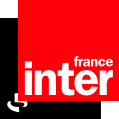France Inter
 | |
| City | Paris |
|---|---|
| Broadcast area | France |
| Slogan | France Inter, la voix est libre |
| Frequency |
AM: 162 kHz (Allouis) Possibly closing at the end of 2016 but still to be confirmed FM: 87.8 MHz (Paris) 91.3 MHz (Marseille) 99.8/101.1 MHz (Lyon) Frequencies |
| First air date | 1 January 1947 |
| Former callsigns |
Club d'Essai (1947) Paris-Inter (1947-1957) France I (1957-1963) RTF Inter (1963) |
| Owner | Radio France |
| Sister stations |
FIP (radio station) France Bleu France Culture France Info France Musique Le Mouv' |
| Website | France Inter |
France Inter is a major French public radio channel and part of Radio France. It is a "generalist" station, aiming to provide a wide national audience with a full service of news and spoken-word programming, both serious and entertaining, liberally punctuated with an eclectic mix of music.
France Inter broadcasts on FM transmitters across France, via the internet, and available in many parts of Western Europe on longwave on 162kHz. The 162kHz transmitter is scheduled to be closed in 2016, saving €13m. A petition has been started to attempt to reverse Radio France's decision to close the transmitter.[1]
History
France Inter was founded in the reorganization of state broadcasting which followed the end of World War II as "Paris-Inter" and charged with being French public radio's generalist (i.e. "full-service") service. The channel was renamed "France I" in 1958, although three years later one of France's most popular radio and television listings magazines was still showing the station's programmes under the heading "Paris-Inter" with "France I" as a subtitle.[2] In 1963 the France I and France II networks were merged to form "RTF Inter", renamed "France Inter" one month later.
The major challenge faced by France Inter at the time of its reorganization in the 1960s was the private "peripheral stations" (in particular, RTL and Europe 1, broadcasting from powerful transmitters outside France) success in capturing the majority of the French radio audience since the war. They had done so by adopting a modern broadcasting style and earning a reputation for greater freedom from government influence.
As well as rapidly modernizing its style to match its competitors, France Inter stressed its freedom from commercial pressures – although it does carry a limited amount of paid-for advertising – and especially presented itself as intelligent radio accessible to a general audience under the slogan Écoutez la différence ("Listen to the difference").
Programmes
France Inter programmes, a number of which have been important milestones in the history of French radio, include:
- Le Masque et la Plume, arts reviews from journalist critics (on air since 1955)
- Le Jeu des 1000 euros, a general-knowledge quiz programme (since 1958)
- Le fou du roi , culture and entertainment programme (2000-2011)
- La marche de l'histoire, formerly Deux mille ans d'histoire, an in-depth daily documentary on a specific historical subject (since 1999)
- Pop Club (1965-2005, i.e. 40 years with the same presenter José Artur)
- Le téléphone sonne, a current affairs discussion and phone-in programme (since 1978)
- Là-bas si j'y suis, a reports programme (1989-2014)
- Le sept neuf, morning news sequence
- classique avec Dessay, formerly Carrefour De Lodéon, classical music programme (since 1992)
References
- ↑ Online petition against closure of LW transmitter
- ↑ La Semaine Radio-Télé 29/41, 8–14 October 1961
External links
- France Inter transmitters map (French)
- France Inter (French)
- Radio France streaming (French)